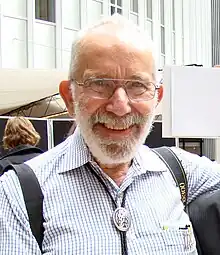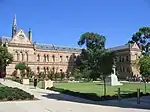Robin Warren
John Robin Warren AC (born 11 June 1937, in Adelaide) is an Australian pathologist, Nobel Laureate and researcher who is credited with the 1979 re-discovery of the bacterium Helicobacter pylori, together with Barry Marshall.[1] The duo proved to the medical community that the bacterium Helicobacter pylori (H. pylori)[1] is the cause of most peptic ulcers.[1]
Robin Warren | |
|---|---|
 Robin Warren in 2009 | |
| Born | John Robin Warren 11 June 1937 |
| Nationality | Australian |
| Education | St Peter's College, Adelaide |
| Alma mater | University of Adelaide |
| Known for | Nobel Prize, discovery of Helicobacter pylori |
| Awards | Paul Ehrlich and Ludwig Darmstaedter Prize (1997) Nobel Prize in Physiology or Medicine (2005) |
| Scientific career | |
| Fields | Pathologist |
| Institutions | Royal Perth Hospital |
Early life and education
Warren received his M.B.B.S. degree from the University of Adelaide, having completed his high school education at St Peter's College, Adelaide.
Career
Warren trained at the Royal Adelaide Hospital and became Registrar in Clinical Pathology at the Institute of Medical and Veterinary Science (IMVS), where he worked in laboratory haematology which generated his interest in pathology.
In 1963, Warren was appointed Honorary Clinical Assistant in Pathology and Honorary Registrar in Haematology at Royal Adelaide Hospital. Subsequently, he lectured in pathology at Adelaide University, then took up the position of Clinical Pathology Registrar at the Royal Melbourne Hospital. In 1967, Warren was elected to the Royal College of Pathologists of Australasia and became a senior pathologist at the Royal Perth Hospital where he spent the majority of his career.
Nobel Prize work
At the University of Western Australia, with his colleague Barry J. Marshall, Warren proved that the bacterium is the infectious cause of stomach ulcers.[2] Warren helped develop a convenient diagnostic test (14
C-urea breath-test) for detecting H. pylori in ulcer patients.[3]
In 2005, Warren and Marshall were awarded the Nobel Prize in Medicine.
An Australian documentary was made in 2006 about Warren and Marshall's road to the Nobel Prize, called "The Winner's Guide to the Nobel Prize". He was appointed a Companion of the Order of Australia in 2007.[4]
Asteroid 254863 Robinwarren, discovered by Italian amateur astronomer Silvano Casulli in 2005, was named in his honour.[5] The official naming citation was published by the Minor Planet Center on 22 April 2016 (M.P.C. 99893).[6]
Personal life
Warren married Winifred Theresa Warren (née Williams) in the early 1960s and together they had five children.[7] Winifred Warren went on to become an accomplished psychiatrist. Following her death in 1997, Warren retired from medicine.[7]
See also
References
- "Press Release: The Nobel Prize in Physiology or Medicine 2005". Nobelprize.org. Retrieved 24 March 2018.
- Marshall BJ, Warren JR (June 1984). "Unidentified curved bacilli in the stomach of patients with gastritis and peptic ulceration". Lancet. 323 (8390): 1311–5. doi:10.1016/S0140-6736(84)91816-6. PMID 6145023. S2CID 10066001.
- Surveyor I, Goodwin CS, Mullan BP, Geelhoed E, Warren JR, Murray RN, Waters TE, Sanderson CR (1989). "The 14
C-urea breath-test for the detection of gastric Campylobacter pylori infection". Med J Aust. 151 (8): 435–9. doi:10.5694/j.1326-5377.1989.tb101252.x. PMID 2593958. S2CID 40191259. - It's an Honour — Companion of the Order of Australia
- "254863 Robinwarren (2005 SM4)". Minor Planet Center. Retrieved 3 September 2019.
- "MPC/MPO/MPS Archive". Minor Planet Center. Retrieved 3 September 2019.
- J. Robin Warren on Nobelprize.org , accessed 11 October 2020
External links
- Robin Warren on Nobelprize.org including the Nobel Lecture Helicobacter - The Ease and Difficulty of a New Discovery
- Robin Warrens homepage
